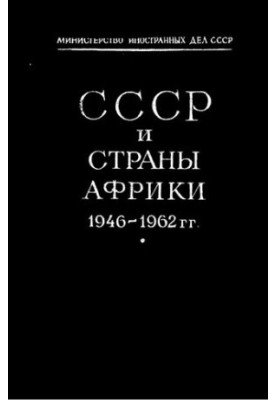USSR and African countries 1946 1962. Documents and materials. In two volumes. Volume II (September 1960 1962)
 Instant download
Instant download
after payment (24/7)
 Wide range of formats
Wide range of formats
(for all gadgets)
 Full book
Full book
(including for Apple and Android)
USSR and African Countries 1946-1962 . Documents and materials. In two volumes . Volume II (September 1960) . 1962 . It is a unique and deep source that reveals the most important stages of diplomatic and political relations between the Soviet Union and African countries in a period full of changes and historical events. This work, made on the basis of carefully collected archival documents and materials , allows the reader to immerse himself in the atmosphere of the era, when the continent of Africa was experiencing its struggle for independence and the formation of new states The USSR took an active part in this process. promoting the ideas of socialism and support for national liberation movements . The main feature of this book is its documentary nature .. Unlike works of art or analytical reviews, it is a collection of original documents, letters, protocols, diplomatic notations and reports that allow us to trace the development of Soviet-African relations in a specific historical period. In this volume, covering September 1960 1962, the reader will find unique materials revealing the strategic plans, diplomatic initiatives and reactions of African countries to the foreign policy steps of the USSR. This period is a time of active contacts, when important events took place on the continent, such as the independence of many African countries, which made relations with the Soviet Union especially important. USSR and African Countries 1946-1962 . » is intended for a wide range of readers interested in history, international relations, political science and the colonial era. It will be especially useful for students , The researchers, Historians and all , Who Wants to Know (CM) How relations between the Soviet Union and Africa developed during the Cold War as well as how the Soviet Union tried to strengthen its position on the continent supporting national liberation movements and forming new allied ties. This book will be interesting for those who are passionate about the history of decolonization, geopolitics and international diplomacy, because it allows you to look at events in terms of official documents, which makes it a valuable source for analysis and comparison. The author of this publication, although unknown, demonstrates a deep knowledge of the topic and skill in the selection and systematization of materials. The style of presentation is strict, academic, while saturated with live facts and analytical comments, which makes reading not only informative, but also exciting. The work stands out for its completeness and objectivity, it not only records events, but also allows you to understand the motives, strategic goals and internal processes that took place in the diplomatic sphere of the two sides. The book pays special attention to the theme of the Soviet Union’s support for African countries in their struggle for independence, as well as the role played by Soviet diplomats and ideologues in the formation of a new world order. In this context, the book reveals not only political aspects, but also cultural, ideological connections, which makes it a valuable contribution to the study of the history of international relations. It shows how the ideas of socialism and communism resonated in the hearts of many African peoples, and how Soviet diplomacy contributed to the strengthening of friendly ties. If you are looking for a book that will help you understand the complex and multifaceted history of the USSR's interaction with Africa during the Cold War era, then "The USSR and the countries of Africa 1946-1962. Documents and materials. In two volumes . Volume II (September 1960) . 1962 . It will be a great source for you. This is not just a collection of documents - it is a window into the past, allowing you to see how the modern African map was formed and what international forces influenced its development. Readers interested in the history of decolonization, international diplomacy, and Soviet foreign policy will find in this publication a wealth of material for analysis and reflection. In general, this book is an important contribution to the study of the history of international relations, which does not lose its relevance today. It helps to understand how the USSR tried to influence events in Africa, and what ideas and strategies were at the heart of this interaction. For those who appreciate archival materials and documentary accuracy, "USSR and African countries 1946-1962. It will be a real discovery, expanding the horizons of knowledge and allowing you to look at history from a new perspective.
LF/602969563/R
Data sheet
- Name of the Author
- Unknown
- Language
- Russian
- Release date
- 1963
- Volume
- 2

















